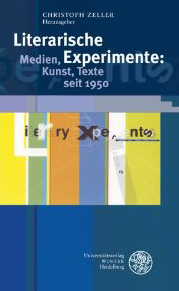 Recent Publication: “TXT BCK? On the Poetics of Electronic Writing.” Literarische Experimente: Medien, Kunst Texte seit 1950. Ed. Christoph Zeller. Heidelberg: Winter, 2012. 97-108.
Recent Publication: “TXT BCK? On the Poetics of Electronic Writing.” Literarische Experimente: Medien, Kunst Texte seit 1950. Ed. Christoph Zeller. Heidelberg: Winter, 2012. 97-108.
The production and dissemination of written language today clearly trumps that of any other age, with e-mail defining new standards for the speed and instantaneity of mediated exchange, with blogs blurring what previous eras considered the lines between the intimate and the public, and with text messaging serving as a virtual life line for the communicative needs and self-expressive energies of an entire generation. The aim of this essay is to discuss and recast the framework in which we have come to discuss the promises and perils of electronic writing. Whereas advocates and critics alike debate the meaning of electronic writing by holding it up to the normative standards of older linguistic and poetic practices, my suggestion is to rethink what it might mean to be poetic and experimental once electronic writing has shifted the entire location of the written word in society.
Walter Benjamin famously read Baudelaire’s work as a heroic effort to probe the possibilities of writing and reading poetry in an era fundamentally hostile to poetic activity – a time in which the speed of modern traffic and the capitalist marketplace had seemingly eroded the pre-condition of poetic experience, namely contemplative absorption and autonomy. Where, so my questions for this essay, can we find the Baudelaire’s of our own age? And what might they do with their electronic devices, not simply to toy around with grammar and style, but to recalibrate through writing the rhythms, speeds, and temporalities of our accelerated present and thus, amid the very rush of machinic time, experiment with the art of absorption, the ecstasy of aesthetic suspension?
